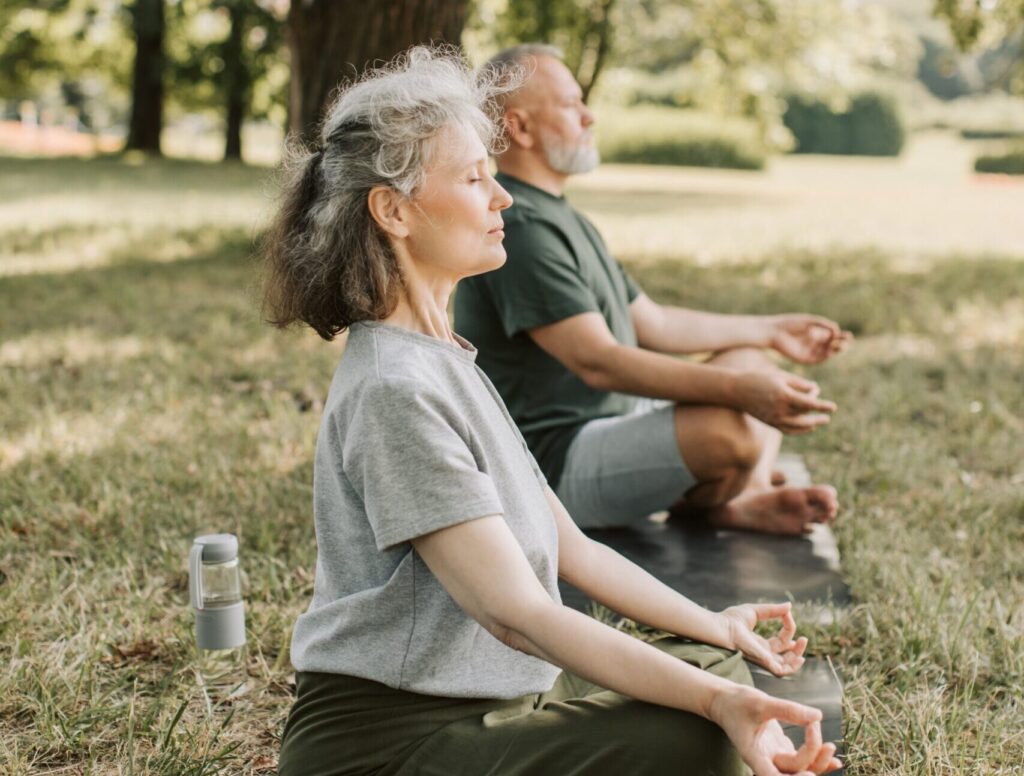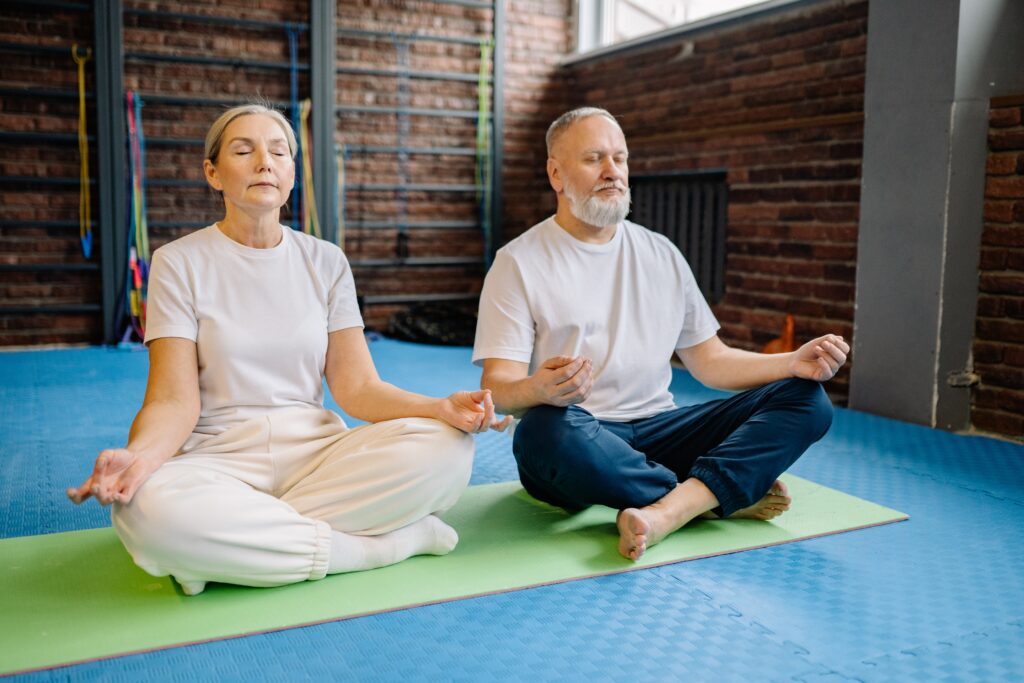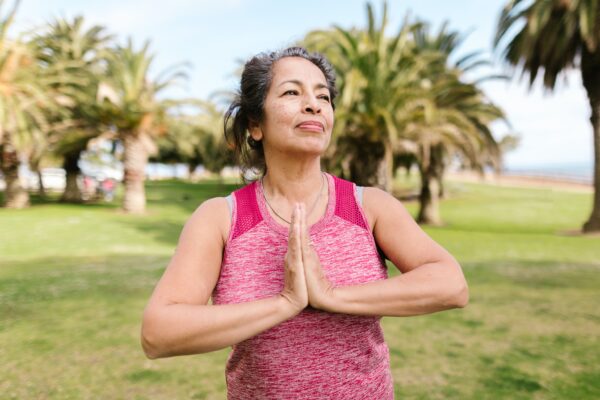Introduction
As we age, we naturally experience changes in our bodies and lives. These changes can be challenging, but they can also offer opportunities for growth, wisdom, and connection. Mindfulness techniques can help seniors to embrace these changes with grace and vitality, cultivating a sense of peace, joy, and purpose in their lives.
Mindfulness is a way of paying attention to the present moment with openness, curiosity, and non-judgment. It involves bringing your attention to your thoughts, feelings, and bodily sensations and accepting them without changing or resisting them. This practice has been shown to have numerous benefits for people of all ages, including reducing stress, anxiety, and depression, improving sleep, and enhancing overall well-being.
Mindfulness is a way of paying attention to the present moment with openness, curiosity, and non-judgment. It involves bringing your attention to your thoughts, feelings, and bodily sensations and accepting them without changing or resisting them. This practice has been shown to have numerous benefits for people of all ages, including reducing stress, anxiety, and depression, improving sleep, and enhancing overall well-being.
For seniors, mindfulness can be especially valuable. As we age, we may face new challenges, such as chronic health conditions, physical limitations, and losing loved ones. Mindfulness can help us to cope with these challenges healthily and constructively and to cultivate a sense of gratitude and joy in our lives.
This article will explore several mindfulness techniques seniors can use to promote vitality, well-being, and graceful aging. These techniques include breathing exercises, mindful walking, gratitude journaling, mindful eating, and meditation. Each practice offers a unique way to cultivate mindfulness and enhance overall well-being.
By embracing the art of aging gracefully through mindfulness techniques, seniors can approach their lives with an open and curious mindset and approach their challenges with grace and resilience. Mindfulness can be a powerful ally in this pursuit, helping seniors stay present, connected, and engaged. So let’s explore the art of aging gracefully with mindfulness techniques.
Breathing exercises
Breathing exercises are a simple but effective way to cultivate mindfulness and relaxation in seniors. Focusing on the breath can help calm the mind, reduce stress and anxiety, and promote a sense of well-being.
Deep breathing is one of the most popular and simple breathing exercises that seniors can practice. This technique involves taking slow, deep breaths in through the nose and out through the mouth. Deep breathing can help to slow down the heart rate and lower blood pressure, which can help to reduce feelings of stress and anxiety.

Another effective breathing exercise for seniors is called “diaphragmatic breathing.” This technique involves breathing deeply into the belly rather than just the chest. To practice diaphragmatic breathing, place one hand on your chest and the other on your belly. Inhale deeply through your nose, feeling your belly rise as you inhale. Then, exhale slowly through your mouth, feeling your belly fall. This technique can help to slow down breathing and promote relaxation.
For seniors who struggle with respiratory issues, pursed lip breathing can be helpful. This technique involves breathing in through the nose and then exhaling slowly through pursed lips as if blowing out a candle. This can help to slow down breathing and improve oxygen flow to the body.
Incorporating breathing exercises into a daily routine can help seniors to feel more relaxed, centered, and grounded. They can be practiced at any time and place, making them a convenient way to promote mindfulness and well-being. Seniors can improve their mental and physical health by taking a few minutes each day to focus on their breathing and enjoy the benefits of mindful living.
Mindful Walking
Mindful walking is a practice that seniors can use to cultivate mindfulness, reduce stress, and improve overall well-being. This form of meditation involves walking with intention and attention, focusing on the sensations in the body and the surrounding environment.
One of the benefits of mindful walking is that it can be done anywhere and at any time. Seniors can practice mindful walking in a park, on a trail, or even in their backyard. The key is to find a peaceful and quiet place to walk without distractions.

To begin a mindful walking practice, take a few deep breaths and focus your attention on your breath. As you start to walk, pay attention to the sensations in your feet as they touch the ground, the movement of your body, and the sights and sounds around you.
As you walk, try to bring your attention back to the present moment whenever your mind wanders. Notice the colors, textures, and smells around you, and fully allow yourself to experience the moment. If you find yourself becoming lost in thought, gently bring your attention back to your breath and the sensations in your body.
Walking mindfully can be especially helpful for seniors who may have physical limitations or find traditional meditation challenging. It is a gentle, low-impact way to incorporate mindfulness into daily life and improve overall well-being.
To enhance the benefits of mindful walking, seniors can also try walking in nature or practicing walking meditation in a group setting. Walking in nature can help to promote feelings of calm and relaxation while walking meditation in a group can foster a sense of connection and community.
Incorporating mindful walking into a daily routine can be a powerful way for seniors to reduce stress, improve mental clarity, and cultivate a greater sense of well-being. By taking the time to walk with intention and attention, seniors can enjoy the benefits of mindfulness in a gentle and accessible way.
Gratitude Journaling
Gratitude journaling is a simple yet effective practice that seniors can use to cultivate a positive mindset and improve their mental and emotional well-being. The practice involves writing down things that you are grateful for each day, no matter how small or insignificant they may seem.
Research has shown that gratitude journaling can have numerous benefits for seniors, including reducing symptoms of depression and anxiety, improving sleep quality, and increasing overall life satisfaction. Focusing on positive experiences and things you are grateful for can help shift your mindset and cultivate a greater sense of contentment and joy in everyday life.

To start a gratitude journaling practice, seniors can set aside a few minutes each day to reflect on their positive experiences and write them down in a journal or notebook. This can include anything from a good conversation with a friend to a beautiful sunset or a delicious meal.
The key is to focus on the positive aspects of each experience and take time to appreciate them fully. This can help to train your brain to focus on the good things in life and develop a more positive outlook overall.
One approach to gratitude journaling is to write down three things you are grateful for each day, along with a brief explanation of why they are important to you. This can make the practice more meaningful and allow you to reflect on the positive aspects of your life more deeply.
Seniors can also incorporate gratitude journaling into a daily routine, such as before bed or first thing in the morning. This can help to make it a habit and ensure that it becomes a regular part of your self-care routine.
Incorporating a gratitude journaling practice into daily life can be a powerful way for seniors to cultivate a positive mindset, reduce stress, and improve overall well-being. By focusing on the good things and fully appreciating them, seniors can enjoy a greater sense of contentment and joy in everyday life.
Mindful Eating
Mindful eating is a practice that involves paying attention to the present moment while eating without judgment or distraction. This means being fully present and aware of the food, the sensations of eating, and the experience of nourishing your body.
For seniors, mindful eating can be a powerful way to improve digestion, reduce stress, and increase overall well-being. By focusing on eating and tuning out distractions, seniors can savor the flavors and textures of their food, notice when they are full, and avoid overeating or mindless snacking.

One way to practice mindful eating is to take a few deep breaths before beginning a meal. This can help to calm the mind and bring focus to the present moment. Then, take a moment to appreciate the appearance and aroma of the food before taking the first bite.
While eating, take time to chew slowly and notice the flavors and textures of the food. Pay attention to how the food feels in your mouth, the sound it makes as you chew, and the sensations in your body as you swallow.
It can also be helpful to avoid distractions while eating, such as watching TV or scrolling through your phone. Instead, focus solely on the experience of eating and nourishing your body.
By practicing mindful eating, seniors can improve their digestion, reduce stress, and cultivate a greater well-being. It can also be a way to fully appreciate and enjoy food, leading to a more positive relationship with food and a greater appreciation for its nourishment.
Meditation
Meditation is a mindfulness technique that focuses the mind on a particular object, thought, or activity to achieve a state of mental clarity and relaxation. For seniors, meditation can be a powerful tool to improve overall well-being and promote calm and inner peace.
Meditation can help seniors to reduce stress and anxiety, improve sleep, and increase feelings of happiness and contentment. It can also help to improve cognitive functions, such as memory, attention, and concentration.

To practice meditation, seniors can start by finding a quiet and comfortable place to sit or lie down. They can then close their eyes and take a few deep breaths to help calm the mind and body.
Next, seniors can focus their attention on their breath, noticing the sensation of the air moving in and out of their nostrils. As thoughts or distractions arise, they can acknowledge them without judgment and gently bring their attention back to the breath.
Seniors can also try guided meditations, which involve listening to a pre-recorded audio that guides them through a meditation practice. These can be helpful for those who are new to meditation or who find it difficult to focus their attention on their breath.
Overall, meditation can be a simple and effective way for seniors to improve their overall well-being and cultivate a greater sense of inner peace and contentment. By practicing meditation regularly, seniors can improve their mental and physical health, reduce stress and anxiety, and enhance their overall quality of life.
In conclusion, mindfulness techniques can be incredibly beneficial for seniors looking to gracefully improve their overall well-being and age. Breathing exercises, mindful walking, gratitude journaling, mindful eating, and meditation are all powerful techniques that seniors can incorporate into their daily lives to reduce stress, increase mental clarity, and promote a greater sense of inner peace and contentment.
By practicing mindfulness techniques regularly, seniors can improve their cognitive function, reduce feelings of anxiety and depression, and enhance their overall quality of life. These techniques can also help seniors to maintain a healthy weight, improve their sleep, and reduce the risk of chronic diseases such as heart disease and diabetes.
Incorporating mindfulness into one’s daily routine may seem daunting at first, but it can become a natural and enjoyable part of daily life with practice. Whether taking a few deep breaths before starting the day, going for a mindful walk, or taking a few minutes to meditate, there are many simple and effective ways that seniors can incorporate mindfulness into their lives.
So, to all seniors, I encourage you to practice mindfulness techniques and gracefully embrace the art of aging. With these simple techniques, you can improve your overall well-being, cultivate inner peace and contentment, and enjoy a fulfilling and meaningful life in your golden years.









